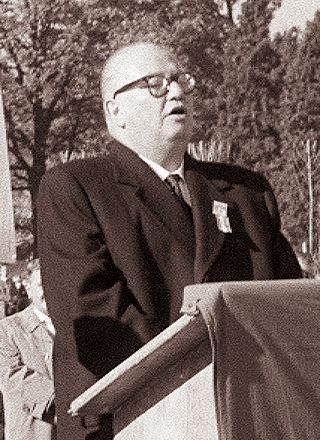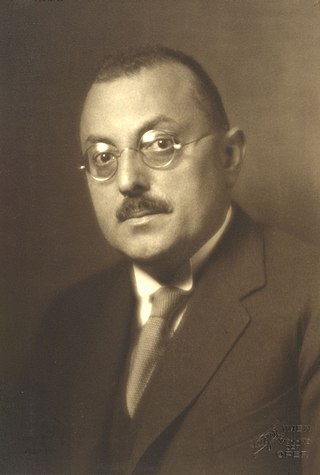Related Research Articles

The Austrian People's Party is a Christian-democratic and liberal-conservative political party in Austria.

Bruno Kreisky was an Austrian social democratic politician who served as Foreign Minister from 1959 to 1966 and as Chancellor from 1970 to 1983. Aged 72 at the end of his chancellorship, he was the oldest Chancellor after World War II. His 13-year tenure was the longest of any Chancellor in republican Austria.

The Luxembourg Socialist Workers' Party, abbreviated to LSAP or POSL, is a social-democratic, pro-European political party in Luxembourg. The LSAP sits on the centre-left of the political spectrum.

Ignaz Seipel was an Austrian Roman Catholic priest, theologian and politician of the Christian Social Party. He was its chairman from 1921 to 1930 and served as Austria's federal chancellor twice, from 1922 to 1924 and 1926 to 1929. Seipel's terms in office saw the reorganization of the state's finances and passage of the 1929 amendment to the federal constitution that strengthened the role of the Austrian President. As chancellor he opposed the Social Democratic Party of Austria and Austromarxism and supported paramilitary militias such as the Heimwehr, an organization similar to the German Freikorps.

Alfred Sinowatz was an Austrian historian and politician of the Social Democratic Party (SPÖ), who served as Chancellor of Austria from 1983 to 1986. Prior to becoming Chancellor, he had served as Minister of Education from 1971 to 1983 and Vice-Chancellor from 1981 to 1983.

Otto Bauer was one of the founders and leading thinkers of the left-socialist Austromarxists who sought a middle ground between social democracy and revolutionary socialism. He was a member of the Austrian Parliament from 1907 to 1934, deputy party leader of the Social Democratic Workers' Party (SDAP) from 1918 to 1934, and Foreign Minister of the Republic of German-Austria in 1918 and 1919. In the latter position he worked unsuccessfully to bring about the unification of Austria and the Weimar Republic. His opposition to the SDAP joining coalition governments after it lost its leading position in Parliament in 1920 and his practice of advising the party to wait for the proper historical circumstances before taking action were criticized by some for facilitating Austria's move from democracy to fascism in the 1930s. When the SDAP was outlawed by Austrofascist Chancellor Kurt Schuschnigg in 1934, Bauer went into exile where he continued to work for Austrian socialism until his death.

Alois Mock was an Austrian politician and member of the Austrian People's Party (ÖVP). He was Vice Chancellor of Austria from 1987 to 1989. As foreign minister, he helped take Austria into the European Union.

Parliamentary elections were held in Austria on 1 March 1970. The result was a victory for the Socialist Party, which won 81 of the 165 seats to become the largest party for the first time in the Second Republic. With the SPÖ two seats short of a majority, SPÖ leader Bruno Kreisky became Chancellor at the head of a minority government that was tolerated by the Freedom Party of Austria in return for electoral reforms that benefitted smaller parties by increasing the proportionality of votes and seats. Voter turnout was 91.8%. It was the first Socialist-led government since 1920, and the first purely left-wing government in Austrian history. The SPÖ would lead the government for the next 29 years.

Friedrich Peter was an Austrian politician who served as chairman of the Freedom Party of Austria from 1958 to 1978. He was an active Nazi between 1938 and 1946.

Bruno Pittermann was an Austrian social democrat politician.
International Group of Democratic Socialists was a Stockholm-based discussion group and study circle of social democrats, active from 1942 to 1945. Participants included Willy Brandt, Alva Myrdal, Gunnar Myrdal and Bruno Kreisky. The group focused largely on discussions of rebuilding post-war Europe.
The Kreisky–Peter–Wiesenthal affair was a political and personal feud in the 1970s, fought between the then Austrian chancellor Bruno Kreisky and the Nazi hunter Simon Wiesenthal, arising from Kreisky's ministerial appointments and the SS past of Freedom Party leader Friedrich Peter, which had been revealed by Wiesenthal.

The Freedom Party of Austria is a national-conservative, right-wing populist, political party in Austria. It has been led by Herbert Kickl since 2021. It is the third largest of five parties in the National Council, with 30 of the 183 seats, and won 16.2% of votes cast in the 2019 legislative election. It is represented in all nine state legislatures, and a member of two state cabinets. On a European level, the FPÖ is a founding member of the Identity and Democracy Party and its three Members of the European Parliament (MEPs) sit with the Identity and Democracy (ID) group.

Robert Danneberg was an Austrian politician, a member of the Social Democratic Workers Party of Austria (SDAPÖ) and a prominent Austro-Marxist theoretician. Danneberg was one of the architects of Red Vienna and he was killed in the Auschwitz concentration camp in 1942.

The Schoenau ultimatum was a hostage-taking incident in Marchegg, Austria by the Palestinian militant group As-Sa'iqa in 1973. At the time Vienna was a transit point for Russian Jews, the largest population of Jews remaining in Europe. The Schoenau ultimatum focused attention away from Egyptian and Syrian military build-up and their planned attack that would come to be known as the Yom Kippur War.

The Social Democratic Party of Austria is a social-democratic political party in Austria. Founded in 1889 as the Social Democratic Workers' Party of Austria and later known as the Socialist Party of Austria from 1945 until 1991, the party is the oldest extant political party in Austria. Along with the Austrian People's Party (ÖVP), it is one of the country's two traditional major parties. It is positioned on the centre-left on the political spectrum.
Since its foundation in 1889, the Social Democratic Party has often been one of the main political forces in Austria. At the start of the First World War it was the strongest party in parliament, and on the ending of that war in 1918 the party leader Karl Renner became chancellor of the First Republic. The party lost power in 1920, but retained a strong base of support in the capital Vienna. A period of rising political violence culminated in the banning of the Social Democratic Party under the Austrofascist dictatorship (1934–38).

Marianella García Villas was a Salvadoran attorney, who served in the Legislative Assembly of El Salvador from 1974 to 1976 before resigning her post to found the first independent human rights commission in the country. After the 1979 coup d'état led to the installation of a military junta, she began documenting human rights abuses in the country, helping families report disappearances and imprisonments. Under personal threat and with escalating violations of rights, García took her documentation to the United Nations Commission on Human Rights, gaining international notice of the situation inside the country. She was assassinated by the Salvadoran Armed Forces in 1983 and was posthumously awarded the Bruno Kreisky Prize for Services to Human Rights.

Roman Felleis was an Austrian political activist. He was a close friend of Bruno Kreisky, with whom he founded the "Revolutionäre Sozialistischen" organisation in February 1934. After Austria's annexation by Nazi Germany in March 1938, both men knew it was only a matter of time before the Gestapo would come for them. Kreisky took an opportunity to flee to Sweden later that same year. Felleis refused to leave. He found work as a road builder which enabled him to change his home frequently and live illegally "underground" so that he might, when he considered the time was right, create and develop cells of party activists. He died on 24 August 1944 as the result of an American bombing raid against Buchenwald concentration camp to where, by this time, he had been taken.
References
- ↑ Barbara Jelavich (1987). Modern Austria: Empire and Republic, 1815-1986 . Cambridge University Press. p. 283. ISBN 978-0-521-31625-5 . Retrieved 27 July 2013.
- 1 2 Bruno Kreisky (2000). The Struggle for a Democratic Austria: Bruno Kreisky on Peace and Social Justice. Berghahn Books. p. 521. ISBN 978-1-57181-155-4 . Retrieved 27 July 2013.
- 1 2 Oliver Rathkolb (2002). "The Kreisky Era, 1970-1983". In Rolf Steininger; Günter Bischof; Michael Gehler (eds.). Austria in the Twentieth Century. Transaction Publishers. p. 269. ISBN 978-1-4128-1196-5 . Retrieved 27 July 2013.
- ↑ Bruce F. Pauley (1992). From Prejudice to Persecution: A History of Austrian Anti-Semitism. Univ of North Carolina Press. p. 304. ISBN 978-0-8078-6376-3 . Retrieved 27 July 2013.